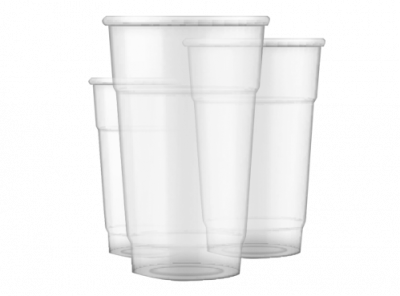Whether you’re looking for promotional wine totes, retail reusable shopping bags, deli bags, clamshell containers, or any other food packaging solution — Servous can and will help. As the leading wholesaler and vendor of food packaging solutions for the retail and hospitality industry, we offer a range of products.
Even within these industries, each business has very unique needs. So, we take a tailored approach to delivering highly effective and efficient solutions. In addition to a wealth of products, we regularly provide our clients with education. Why? Because we believe that more informed clients are better clients. To that end, let’s take a closer look at polypropylene materials.
What Is Polypropylene?
Polypropylene (PP) is an ideal food-safe plastic that is used for processes that involve high heat. PP is regularly used for ready-to-eat meals, sour cream containers, yogurt containers, and more. This material has gained wide popularity for microwavable containers.
Polypropylene is one of the most reliable packaging materials available. It withstands repeated impacts, which makes it one of the most popular plastic choices for food containers that may be dropped during shipping and handling.
Many polypropylene products are not only flexible but can be clear as well. This is an especially helpful feature when it comes to packaging food items because your customers can see the visual appeal of your product before purchasing it.
Some of the physical traits of polypropylene are:
- Polypropylene absorbs and distributes shock well.
- It is resistant to sudden changes in temperature
- It can be microwave safe
- Containers made from polypropylene do not crack and break when squeezed
The Environmental Benefits of Polypropylene
While polypropylene is a non-renewable resource, it is highly versatile and has a low carbon footprint when compared with other materials. In addition, polypropylene can be recycled easier than many other plastic products. This makes it much more environmentally friendly than non-recycled plastics.
On average, it takes less energy to produce polypropylene goods than it does with other materials. Polypropylene has a low carbon footprint:
- Widely recycled
- Generates little waste during production and disposal
- More energy efficient during production
FDA-Approved Polypropylene Food Packaging
Polypropylene is considered to be one of the safest plastics to use. In fact, it is often used for medical equipment and can be found in a wide variety of items that people use every day. Plastic products made from polypropylene are free of Bisphenol A (BPA) which is a compound used to make some plastics. Polypropylene is:
- BPA Free
- Free of toxic fumes when burned
- Food Safe
- Microwave safe
Is Polypropylene Packaging Biodegradable?
Typically the durability of polypropylene means that it is not biodegradable, but there are many grades of polypropylene that do biodegrade. It very much depends on which grade of polypropylene has been used to make the packaging.
All plastic products are stamped with a number typically between 1 and 7. This tells you which type of plastic it is and whether it can be recycled. Polypropylene products are stamped with a #5 which means that it is very recyclable even if it is not biodegradable.
Contact Servous for Polyethylene Food Packaging Products
At Servous, we offer versatile food packaging solutions manufactured from polypropylene. Don’t know which material would be best for your application? The team at Servous can and will help.
We can conduct a needs analysis to uncover your needs and guide you to the best solution. No matter what you order, when you partner with Servous, you’ll enjoy:
- Unwavering commitment to customer service
- Tailored solutions at every step
- Exceptional value throughout the process
- Flexibility in design, color, and style
- Fast order fulfillment and shipping
- Excellent quality
Contact Servous today!














